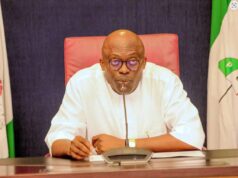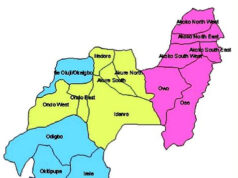 • Oyebode, others fault lawmakers’ power to carry out task
• Oyebode, others fault lawmakers’ power to carry out task
• ‘It is another opportunity to restructure nation’
• YCE, Ohanaeze seek return to confab report
Discordant reactions yesterday trailed the move by the Senate to review the nation’s constitution.The Senate President, Ahmed Lawan, constituted a 56-member panel made up of seven principal officers as a steering committee for the constitution review, with one senator each from the 36 states and two each representing the six geopolitical zones.
He named his deputy, Ovie Omo-Agege as the chairman of the steering committee. The seven principal officers are the Senate Leader, Abdullahi Yahaya; Robbert Borriffice; Sabi Abdullahi; Senate Minority Leader, Enyinaya Abaribe; Emmanuel Bwacha; Philip Aduda; and Sabi Yau.
But the only Young Progressive Party (YPP) Senator Ifeanyi Uba raised an objection to the effect that his party was not taken into account even when it is the third in the Senate after the All Progressives Congress (APC) and the Peoples Democratic Party (PDP).
“We have three political parties in the Senate, APC, PDP and YPP. There was no mention of my political party in the constitutional review committee and I feel it may be an oversight. You should consider my party because we are here on our own, I am here for my party caucus just like every other senator.”
But Lawan said: “Because you have come under order 43, this is for our information. The membership is not strictly based on political parties. At the beginning, I said each state would be represented by a senator each and then each geopolitical zone would have zonal representation. So it is not based on political parties but your point of order is well taken.”
Reacting to the development yesterday, a professor of International Law and Jurisprudence in the University of Lagos, Akin Oyebode said the Nigerian constitution or “Decree 24 of 1999” could be likened to a car whose body had undergone so many panel beatings. “Not only is it not autochthonous, it does not answer the needs of the age and so should be replaced by a more authentic and worthwhile fundamental law. However, it is neither the place nor function of the National Assembly, being a parliament set up to enact legislation for the peace, order and good government. The rightful body to discharge the duty of fashioning a new fundamental law is a duly convened constituent assembly, otherwise, it would amount to the tail wagging the dog,” he declared.
The Lower Niger Congress (LNC), said it was an exercise in futility, a journey to nowhere and an affront to the constituent components of Nigeria.In a statement endorsed by its Secretary General, Mr. Tony Nnadi, the group said that “the legislative mandate/power of the National Assembly does not include constitution-making, which requires constituent powers that are vested exclusively in the people as an incident of their sovereignty.”
The LNC, a platform aggregating self-determination initiatives across the lower Niger territory to facilitate the emergence of a new constitutional order, stressed that the 1999 Constitution the lawmakers seek to review had been repudiated countrywide for being a fraud and an imposition.
“Let those who wish to research or understand this assertion look up Section 14 (2)(a) of the so-called 1999 Constitution, which states that ‘Sovereignty belongs to the people, from whom government, through this constitution, derives all its powers and authority.’
“Accordingly, any one who does not know that the National Assembly does not have the constituent powers to make or remake the constitution of Nigeria is simply ignorant on the subject, whether such a person is a senior advocate or a professor of law,” the group said.
According to the LNC, there is a countrywide push to take down the “rogue 1999 constitution” and restore the hijacked sovereignties of the constituent components of the Nigerian union.
“Those in the National Assembly who now pretend that they are the new custodians of our sovereignties simply because they were elected, should realise that they are by that pretense, aiding and abetting the treason already committed by those who first hijacked our sovereignties by imposing the fraudulent 1999 Constitution. They are by that act of abetting the original sin, committing treason against the rest of us and let it be clear to them that when things will snap for Nigeria, consequences will attach for their current role.
“Let it also be made clear that whatever the 9th Assembly does in the so-called constitution review they are initiating will go down with the 1999 Constitution when it is rejected on the streets by the constituent components of Nigeria currently choking under it.”
A Lagos lawyer, Tony Odiadi, said the review would be a palliative measure that would not deal with the fundamentals of the country’s national condition.
His words: “If you read the mood well, Nigerians have drifted to regionalism. The federal structure as currently constituted is a burden on component states. Cooperation by states on economic development, security and infrastructure within the noted regions seems clearly where the majority of Nigerians are moving.
“The seeming failure of governance at the centre with a sense of alienation by some, pervasive insecurity, economic stagnation, infrastructure gaps here and there are matters, which clearly can be addressed within collective regional mandates. Poor resource management and ownership feed into the frustration experienced in different regional enclaves currently.”
According to him, the Senate ought to know that constitutional amendment is not what Nigerians want at this point but fundamental restructuring.
“There was a sovereign conference in 2014 where all the issues holding down Nigeria as a country and her component parts were fully discussed and final position raised on each item. The Senate should raise a committee to study and develop those matters as restructuring first steps,” he advised.
But former deputy director-general, Nigerian Law School, Prof. Ernest Ojukwu (SAN), praised the initiative.He said: “It is another opportunity for positive steps towards restructuring which has no single definition or framework. The outcome of restructuring a system depends on the agreement of the citizens. That agreement can be achieved through constitutional reforms or through revolutionary changes outside the existing constitutional order. You cannot expect existing legislators to abandon their role and hand over power to non-elected persons to dictate how the state should be governed. Until such a sovereign discussion or platform is created, the only thing left for the National Assembly is to seek constitutional reforms. It is left to us the people to continue to advocate and pressure our representatives to successfully present our vision and dreams of the kind of structure we want.
“I don’t believe that we should continue the 20 years argument that the constitution was not written by the people but by the military, nay General Abdusalam. That argument is now academic. The Nigerian nation exists now on the basis of the 1999 Constitution. Other than a revolution, we cannot wish away the constitution.”
Similarly, a constitutional lawyer and author, Chief Sebastian Hon (SAN) said the review of the constitution could, in fact, amount to restructuring.
“Indeed, there can be no profound restructuring without a deep amendment of the constitution. As the grund norm, the constitution is the controlling legal instrument that basically regulates our daily lives as a geo-polity. Any meaningful restructuring, therefore, must be benchmarked by this legal instrument, otherwise, it is a non-starter,” he said. He suggested that Nigerians should sternly demand from their leaders in the National Assembly fundamental restructuring of the body polity, politically and economically.He said that such demands could come through lobbying, interpersonal contacts, town hall meetings, public advocacy and organised public meetings.
[
According to him, members of the National Assembly belong to senatorial districts and federal and state constituencies. “They are flesh and blood; and more importantly, have executed a social contract with their constituents. They must be made to not just listen to us, but also, through exertion of lawful pressure, to pander to our wishes. All Nigerians of good will must rise to this challenge. It is our legitimate right to do so,” he stated.
Also, Lagos-based lawyer, Stephen Azubuike said: “The constitutional framework of the country upon proper review can tackle the craving for restructuring. It depends on how you want to look at it. The current political strongholds of the nation do not appear to favour restructuring in the time being and years to come.”
Also, Chief Albert Akpomudje (SAN) reasoned that it might be an opportunity to make provision for restructuring. “I think we are not practising true federalism. I believe this is the cause of the several problems bedevilling the country. The most important is the issue of insecurity and state police, which is becoming very clear as an imperative to address the security problems,” he said.
The Secretary General of the Yoruba Council of Elders (YCE), Dr. Kunle Olajide, said: “On the state of our economy and tension in the polity, to review the constitution is very good. But the reports of the 2014 confab and 2017 El-rufai committee on devolution of power should be looked into. Those two reports say it all, instead of merry-go-rounding. We have more than enough of what the Senate is about to do. If the political leadership is averse to looking into the two reports, then let us have a sovereign national conference.”
The apex Igbo socio-cultural organization, Ohanaeze Ndigbo berated the National Assembly, insisting that the action was diversionary.
The group asked the leadership of the National Assembly and that of the APC to go back to the resolutions of the 2014 national conference, saying it contained over 600 resolutions that if implemented could better the lot of Nigerians.The Deputy National Publicity Secretary of Ohanaeze Ndigbo, Chief Chuks Ibegbu, insisted that the country did not need a fresh constitutional amendment by the Senate but the implementation of reports of the confab to move forward.







